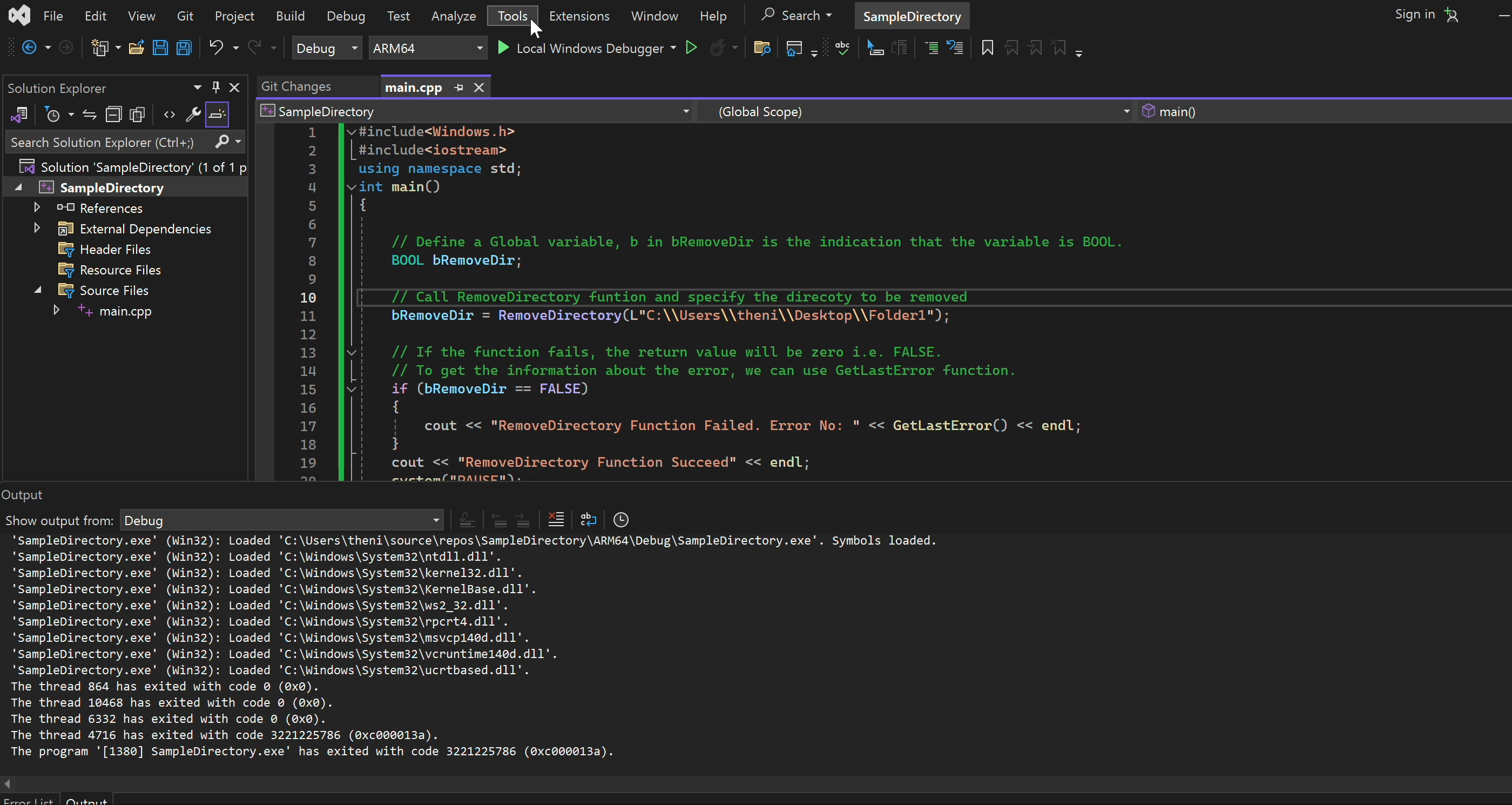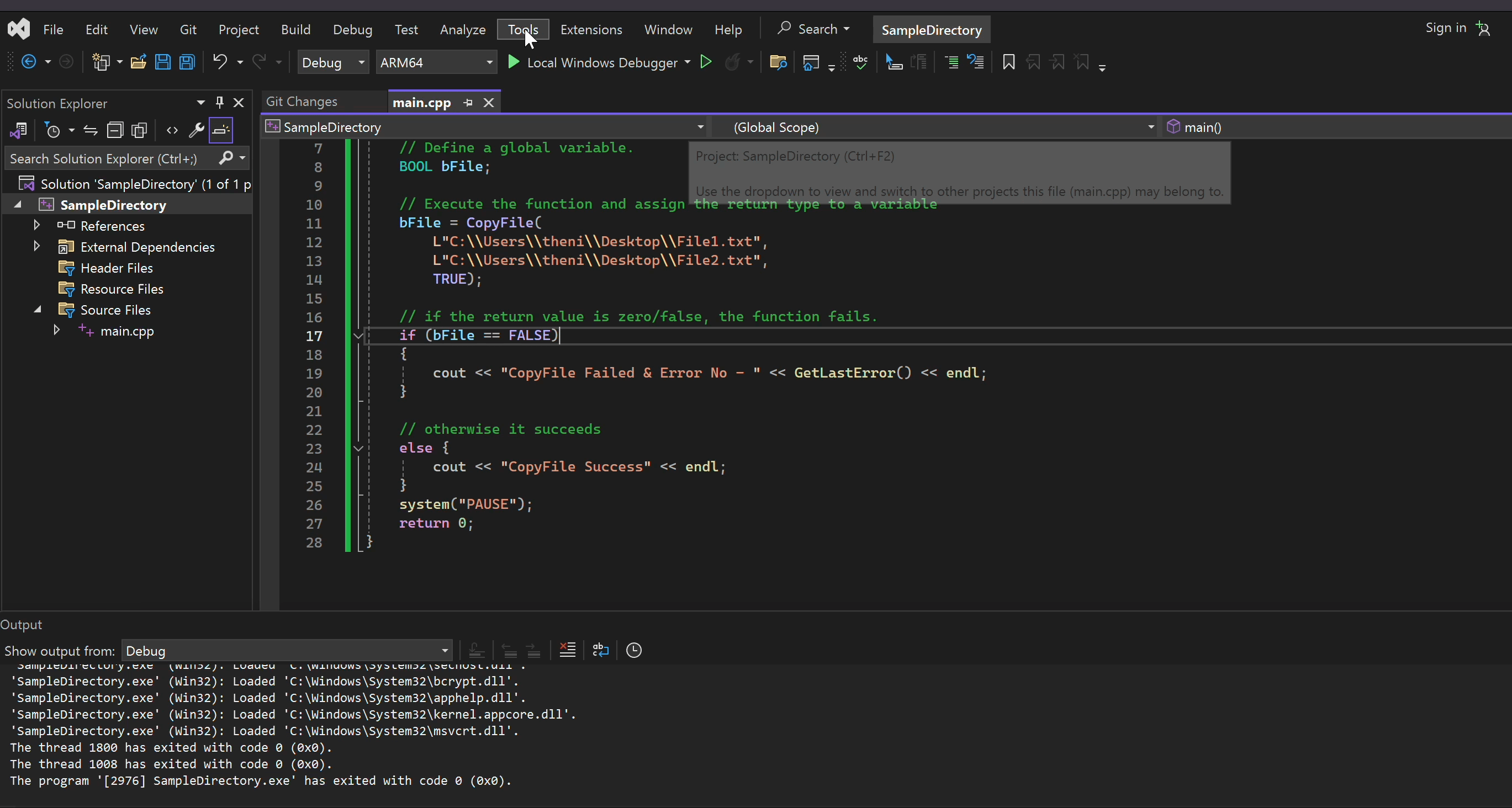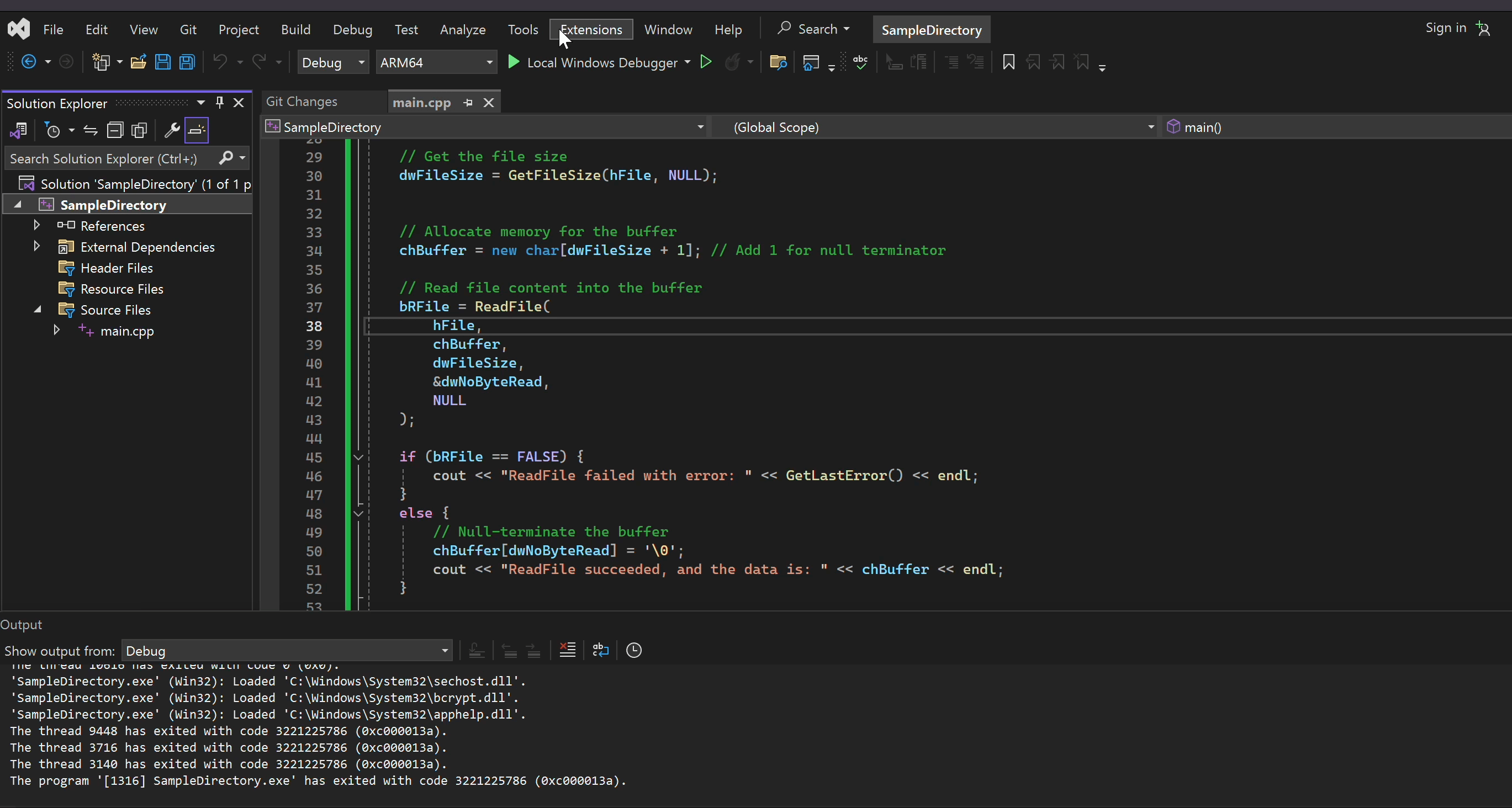Supposed to be Intro
The code snippet below and its explanations cover various useful Windows functions and APIs that can be implemented using the C++ language for system programming purposes. Here, we’ll discuss the basic terms associated with these functions. If you’re new to C++, don’t worry, we’ll walk through it together, as I’m also new to it (no, please learn some syntax first).
Since we are dealing with the Windows API, we need to use Windows.h as a header file which contains declarations for all of the functions in the Windows API. Also iostream is used for data input and output.
Basic Syntax Format for this blog:
1
2
3
4
5
6
7
8
9
10
#include<Windows.h> // Import Windows API Functions
#include<iostream> // Input and Output
using namespace std; // Allows a program to use names for objections and variables from the standard library like cout and endl
int main() // Entry point of the program.
{
// YOUR CODE HERE
system("PAUSE"); // Wait for the user to exit the program.
return 0;
}
Directories and Files
Create a Directory
The CreateDirectory function creates a new directory on the specified path. The return type of the function is BOOL and it contains two parameters lpPathName and lpSecurityAttributes.
- lpPathName: Contains value for the path of the directory which needs to be created. Its data type is LPCTSTR which means Long Pointer to Constant TCHAR String. It is commonly used in Windows API functions to pass string parameters.
- lpSecurityAttributes: Used to define the security attributes for the folder being created like defining who can access it and what operations they can perform. More info about it on MSDN.
Syntax for CreateDirectory
1
2
3
4
BOOL CreateDirectory(
[in] LPCTSTR lpPathName,
[in, optional] LPSECURITY_ATTRIBUTES lpSecurityAttributes
);
Here on the above syntax, [in] means that it is an input parameter and [in, optional] means that it is an optional input parameter which means we can set it as NULL. When the lpSecurityAttributes is set to Null, the directory gets a default security descriptor.
1
2
3
4
5
6
7
8
9
10
11
12
13
14
15
16
17
18
19
20
21
22
23
24
25
26
#include<Windows.h>
#include<iostream>
using namespace std;
int main()
{
// Define a Global variable, b in bCreateDir is the indication that the variable is BOOL.
BOOL bCreateDir;
// Create a Function and pass the directory path
bCreateDir = CreateDirectory(
L"C:\\Users\\theni\\Desktop\\Dir1", // L indicates for Long
NULL);
// If the function fails, the return value will be zero i.e. FALSE.
// To get the information about the error, we can use GetLastError function.
if (bCreateDir == FALSE)
{
cout << "CreateDirectory Function Failed. Error No: " << GetLastError() << endl;
}
cout << "CreateDirectory Function Succeed" << endl;
getchar();
system("PAUSE");
return 0;
}
Run the above Code
- Click on ‘Build -> Build Solution’ to compile the code.
- Click on ‘Debug -> Start Debugging’ to run the program.
Delete a Directory
Windows API contains a function RemoveDirectory to delete the directory from the specified path. It consists of a single parameter lpPathName which specifies the path of the directory to be removed. It works like the rmdir command on Linux, and the directory should be empty when invoking this API.
Syntax
1
2
3
BOOL RemoveDirectoryA(
[in] LPCSTR lpPathName
);
1
2
3
4
5
6
7
8
9
10
11
12
13
14
15
16
17
18
19
20
21
22
#include<Windows.h>
#include<iostream>
using namespace std;
int main()
{
// Define a Global variable, b in bRemoveDir is the indication that the variable is BOOL.
BOOL bRemoveDir;
// Call RemoveDirectory funtion and specify the direcoty to be removed
bRemoveDir = RemoveDirectory(L"C:\\Users\\theni\\Desktop\\NewFolder1");
// If the function fails, the return value will be zero i.e. FALSE.
// To get the information about the error, we can use GetLastError function.
if (bRemoveDir == FALSE)
{
cout << "RemoveDirectory Function Failed. Error No: " << GetLastError() << endl;
}
cout << "RemoveDirectory Function Succeed" << endl;
system("PAUSE");
return 0;
}
Create File
Windows contains CreateFile function which creates or opens a file. The return type of the function is a handle, which is a unique identifier used by Windows programs to manage and interact with resources, such as files, devices, windows, or memory blocks. When a program requests access to a resource, the operating system assigns a handle to it. For this function, we are using a file handle.
The CreateFile function contains seven different arguments with one optional.
- lpFileName: Similar to the functions above, this specifies the name or path of the file or device to be created or opened.
- dwDesiredAccess: The mode in which you want to open the file, mostly GENERIC_READ and GENERIC_WRITE. It includes two additional modes: GENERIC_ALL, which allows all possible access rights, and GENERIC_EXECUTE, which allows the file to be executed.
- dwShareMode: The mode in which you want to share the file, mostly FILE_SHARE_READ. It includes three additional modes: 0, which prevents other processes from opening the file; FILE_SHARE_DELETE, which enables the operation to delete the file; and FILE_SHARE_WRITE, which enables write access to the file. Note that the modes specified in dwShareMode should align with the modes in dwDesiredAccess, meaning you cannot grant a permission that conflicts with the access mode specified in an existing request with an open handle. In such cases, it will return an ERROR_SHARING_VIOLATION error.
- lpSecurityAttributes: Optional parameter, can be left as NULL to assign it the default value.
- dwCreationDisposition: This parameter specifies an action to take on a file if it already exists. Actions include CREATE_ALWAYS, which overwrites an existing file; CREATE_NEW, which creates a new file only if it does not exist; OPEN_ALWAYS, which opens a file if it exists and creates a new file if it does not; OPEN_EXISTING, which only opens a file if it exists; and TRUNCATE_EXISTING, which truncates the file to zero if it exists.
- dwFlagsAndAttributes: Defines the attributes for the file, whether the file should be archived, encrypted, hidden, offline, read-only, used only by the system, or available temporarily. We can use FILE_ATTRIBUTE_NORMAL to not set any attributes on it.
- hTemplateFile: Optional parameter that contains a handle to a template file. Can be set to NULL.
The return value for the function is an open handle to the specified file when the function succeeds and INVALID_HANDLE_VALUE when the function fails.
Syntax
1
2
3
4
5
6
7
8
9
HANDLE CreateFileA(
[in] LPCSTR lpFileName,
[in] DWORD dwDesiredAccess,
[in] DWORD dwShareMode,
[in, optional] LPSECURITY_ATTRIBUTES lpSecurityAttributes,
[in] DWORD dwCreationDisposition,
[in] DWORD dwFlagsAndAttributes,
[in, optional] HANDLE hTemplateFile
);
1
2
3
4
5
6
7
8
9
10
11
12
13
14
15
16
17
18
19
20
21
22
23
24
25
26
27
28
29
30
31
32
33
34
#include<Windows.h>
#include<iostream>
using namespace std;
int main()
{
// Define a handle, h on hFile is known as handle.
HANDLE hFile;
// Create a function
hFile = CreateFile(
L"C:\\Users\\theni\\Desktop\\Dir1\\CreateFile.txt", // Creates a file
GENERIC_READ | GENERIC_WRITE, // Opens the file in read and write mode.
FILE_SHARE_READ, // Enable other process to open the file in read mode.
NULL,
CREATE_NEW, // Creates a new file only when it does not exists.
FILE_ATTRIBUTE_NORMAL, // Does not sets any attributes
NULL);
// Returns a error message if INVALID_HANDLE_VALUE
if (hFile == INVALID_HANDLE_VALUE)
{
cout << "CreateFile Failed & Error No =" << GetLastError() << endl;
}
else {
// Otherwise the operation is success
cout << "CreateFile Success" << endl;
}
// close the handle
CloseHandle(hFile);
system("PAUSE");
return 0;
}
Copying File
The CopyFile function generally copies an existing file and its contents into a new file. It consists of three parameters and the return type is BOOL. The first parameter is lpExistingFileName, which holds the name of an existing file. The second one is lpNewFileName, which holds the name of the new file. The last one is bFailIfExists, which is a BOOL type that determines the action based on its value. If the value is TRUE and lpNewFileName specifies a file name that already exists, the function fails. If the value is FALSE and lpNewFileName specifies a file name that already exists, the new file overwrites the existing file.
Regarding the return type, if the function fails, it returns zero. It returns a nonzero value for successful execution.
Syntax
1
2
3
4
5
BOOL CopyFile(
[in] LPCTSTR lpExistingFileName,
[in] LPCTSTR lpNewFileName,
[in] BOOL bFailIfExists
);
1
2
3
4
5
6
7
8
9
10
11
12
13
14
15
16
17
18
19
20
21
22
23
24
25
26
27
28
#include<Windows.h>
#include<iostream>
using namespace std;
int main()
{
// Define a global variable.
BOOL bFile;
// Execute the function and assign the return type to a variable
bFile = CopyFile(
L"C:\\Users\\theni\\Desktop\\File1.txt",
L"C:\\Users\\theni\\Desktop\\File2.txt",
TRUE);
// if the return value is zero/false, the function fails.
if (bFile == FALSE)
{
cout << "CopyFile Failed & Error No - " << GetLastError() << endl;
}
// otherwise it succeeds
else {
cout << "CopyFile Success" << endl;
}
system("PAUSE");
return 0;
}
Reading the File
TODO
1
2
3
4
5
6
7
8
9
10
11
12
13
14
15
16
17
18
19
20
21
22
23
24
25
26
27
28
29
30
31
32
33
34
35
36
37
38
39
40
41
42
43
44
45
46
47
48
49
50
51
52
53
54
55
56
57
58
59
60
#include <Windows.h>
#include <iostream>
using namespace std;
int main() {
HANDLE hFile;
BOOL bRFile;
char* chBuffer = nullptr;
DWORD dwFileSize;
DWORD dwNoByteRead;
// Open file for reading
hFile = CreateFile(
L"C:\\Users\\theni\\Desktop\\File1.txt",
GENERIC_READ,
FILE_SHARE_READ,
NULL,
OPEN_EXISTING,
FILE_ATTRIBUTE_NORMAL,
NULL
);
if (hFile == INVALID_HANDLE_VALUE) {
cout << "Unable to Open the File, Error: " << GetLastError() << endl;
return 1;
}
// Get the file size
dwFileSize = GetFileSize(hFile, NULL);
// Allocate memory for the buffer
chBuffer = new char[dwFileSize + 1]; // Add 1 for null terminator
// Read file content into the buffer
bRFile = ReadFile(
hFile,
chBuffer,
dwFileSize,
&dwNoByteRead,
NULL
);
if (bRFile == FALSE) {
cout << "ReadFile failed with error: " << GetLastError() << endl;
}
else {
// Null-terminate the buffer
chBuffer[dwNoByteRead] = '\0';
cout << "ReadFile succeeded, and the data is: " << chBuffer << endl;
}
// Cleanup
delete[] chBuffer;
CloseHandle(hFile);
system("PAUSE");
return 0;
}




